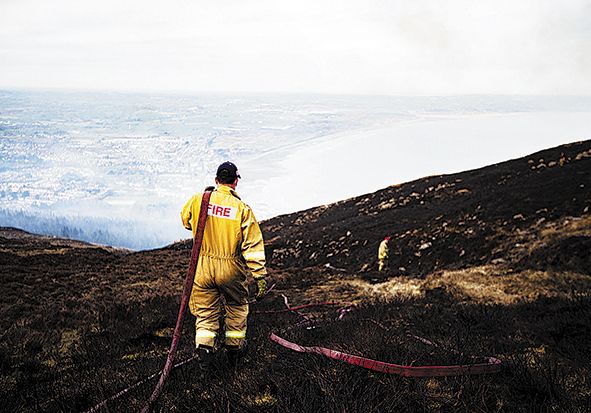Arsonists warned they could face prosecution
Arsonists warned they could face prosecution
15 October 2025

A STARK warning has been issued to people who deliberately start wildfires across Northern Ireland that they will be taken to court.
In a new strategic framework dealing with the wildfires issue, Stormont Environment Minister Andrew Muir made it clear that police are determined to track down arsonists and prosecute them.
Hundreds of acres of precious land across the Mournes have been destroyed over recent years, with the most devastating incident in May 2021.
The blaze — which took three days to extinguish – destroyed an estimated 900 acres of land, with the scars left in an area of outstanding natural beauty by one of the biggest gorse fires in living memory in Northern Ireland expected to take many years to heal.
Huge flames fanned by winds and difficult terrain presented firefiighters with significant challenges as they worked around the clock to save as much of a landscape teaming with life as they could during what was a complex operation in May 2021.
Some had to travel up to an hour on foot to reach the blaze carrying their equipment with small pumps used to drain water from rivers and other small pockets of water that they could find.
Firefighters also used back pack sprayers but the majority had to use shovels and beaters to tackle the fire in harsh conditions.
The environmental impact of the blaze — which could be seen up to 20 miles away — was described as “immeasurable” by the National Trust.
There were also series of wildfires in the Mournes last April, with hundreds of acres of rich habitat destroyed.
Running up until 2030, the new framework focuses on prevention, preparedness, response, recovery and enforcement and is being backed by various Stormont departments, PSNI and Fire and Rescue Service.
It paves the way for the development of a detailed wildfire action plan over the next year and will be followed in 2026 by a dedicated Wildfire Action Plan.
At the framework’s formal launch, Mr Muir said a joined-up approach between organisations including government departments and emergency services was the best way to reduce the threat of wildfires in Northern Ireland and should mark a “turning point for how we collectively tackle them”.
He said they had been a key area of concern for environmental groups in recent years, with more than 200 wildfires, which again included the Mournes, over the course of a few days at the start of April.
Mr Muir declared: “I’ve got a clear message for those who are deliberately setting malicious fires in our countryside, We’re coming after you and for those who are shielding them, you need to give them up.”
The minister said it was important that different agencies worked together to tackle wildfires.
On the key issues of enforcement, the new framework identifies that there should be a review of the laws around wildfires caused by malice or negligence.
“It’s only by the grace of God that no one’s been killed or seriously injured as a result of them,” Muir said.
“Those who are going out and deliberately lighting malicious fires in our countryside they need to think twice. They need to know that Police Service of Northern Ireland knows about this and that they’re going to be looking for prosecutions.”
The framework hopes that it can encourage communities, agencies and landowners to work together, leading to a better ability to detect and prepare for wildfires and also improve coordination when tackling the fires and when helping the recovery process.
“The framework is an important step towards making our communities more resilient to wildfires, making them aware of the danger’s wildfires pose to health and providing them with tools to adapt to and mitigate wildfire risks through prevention, preparedness and vigilance,” said Mr Muir.
“Climate change meant wildfires were more likely, with the new framework focusing on developing early warning systems and improving cross-border cooperation.”
Mr Muir said wildfires presented a “growing threat” to landscapes, biodiversity, property, local infrastructure and the lives of communities of Northern Ireland.
“As we face increasing pressures from climate change and an evolving natural environment, it is essential that we are proactive, prepared and resilient in our approach to wildfire management,” he continued.
“This strategic framework outlines a unified approach to tackling the problem of wildfires. Developed in partnership with the Environment Agency, Fire and Rescue Service and other wildfire stakeholders, it sets out a pathway towards a detailed set of coordinated actions that will seek to manage and reduce wildfire risks in the countryside and in the rural/urban interfaces.”
Mr Muir said the framework was a “road map designed to reduce the incidents and severity of wildfires, enhance our preparedness and collective response to wildfires, mitigate their impact, and safeguard the natural beauty of Northern Ireland”.
He said it reflected a collaborative approach involving key stakeholders, including local government, emergency services, landowners, and environmental organisations, all working together to deliver a coordinated, effective approach.
Mr Muir added: “Our vision is to create a wildfire-resilient Northern Ireland where communities, agencies, and landowners work collaboratively to reduce the incidence and severity of wildfires, protect life and the environment, and respond effectively to wildfire incidents.”


